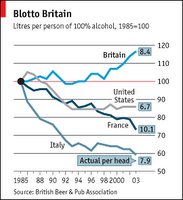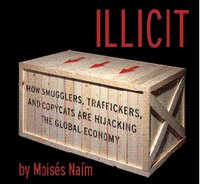"I'm ombibulous. I drink every known alcoholic drink and enjoy them all."
That's the voice of the legendary American journalist H.L. Mencken; and Ombibulous was his term for his love of liquor and hatred of Prohibition.
He would be game to celebrate the new 24-hour drinking license created in the UK. But blokes who fear that open bottles night and day will produce gluttons and public disturbances aren't toasting up cheers when British binge drinking is already as notorious as the inebriated rioting.
Well, there's no doubt that the American Prohibition was a wild failure. The puritanical moral vanguard in the U.S. aimed to restrict drink, but instead distilled professional (often violent) bootleggers, speakeasies, and a preference for the stronger stuff.
But regulation is a complicated beast, whose effects are not always intuitive.
In his new book, Moisés Naím, editor of Foreign Policy, puts forward a story of the international, multi-industry illicit market as a singular phenomenon and a product of globalization. In Illicit, Naím focuses on how the easy-going economic liberalization of trade, finance, and movement, accelerated by technological advances in travel, production, and communications, not only lubricated significant economic growth, but also let loose a more virulent black-market alongside it. In every way the licit economy benefited, Naím tells us, so too did the smugglers of the illicit economy--whose size is estimated in the trillions.
Naím assured me, in an interview to be published shortly, that his intention is certainly not to discourage liberalization and that the gains made in the last decade are absolutely worth the costs involved, including the growth of the black market. He's probably right. Yet, this is clearly a situation in which withdrawing regulation had unanticipated consequences. The United States,foremost among liberalization advocates, is also foremost among its losers to the illicit market, Naím notes.
Today the success of the black-market rests not only on producing that which government intervention otherwise makes expensive (in the most extreme case, through banning), but also on offering impostors of legal products at a fraction of the price: fake Prada bags, two dollar DVDs, nearly identical brand-name goods.
Returning to that ombibulous land, where abundance and low prices has produced intoxicated Brits, longer hours at the pub probably won't create a string of bootleggers. What will it do? Well, that's the point; it's not necessarily clear. Government intervention, whether hailed or hated, is an unpredictable beast, whose effects can be as unwieldy as the semi-rational actors who operate in it.
27.11.05
Ombibulous
Posted by melanie at 5:41 PM
Subscribe to:
Post Comments (Atom)




0 Comments:
Post a Comment